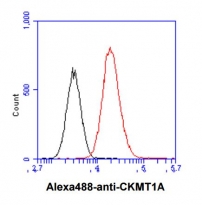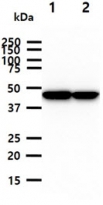ARG57033
anti-CKMT1A antibody [17A2]
anti-CKMT1A antibody [17A2] for Flow cytometry,Western blot and Human
Overview
| Product Description | Mouse Monoclonal antibody [17A2] recognizes CKMT1A |
|---|---|
| Tested Reactivity | Hu |
| Tested Application | FACS, WB |
| Host | Mouse |
| Clonality | Monoclonal |
| Clone | 17A2 |
| Isotype | IgG2b, kappa |
| Target Name | CKMT1A |
| Antigen Species | Human |
| Immunogen | Recombinant fragment around aa. 40-417 of Human CKMT1A. |
| Conjugation | Un-conjugated |
| Alternate Names | CKMT1; U-MtCK; mia-CK |
Application Instructions
| Application Suggestion |
|
||||||
|---|---|---|---|---|---|---|---|
| Application Note | * The dilutions indicate recommended starting dilutions and the optimal dilutions or concentrations should be determined by the scientist. |
Properties
| Form | Liquid |
|---|---|
| Purification | Purification with Protein A. |
| Buffer | PBS (pH 7.4), 0.02% Sodium azide and 10% Glycerol. |
| Preservative | 0.02% Sodium azide |
| Stabilizer | 10% Glycerol |
| Concentration | 1 mg/ml |
| Storage Instruction | For continuous use, store undiluted antibody at 2-8°C for up to a week. For long-term storage, aliquot and store at -20°C. Storage in frost free freezers is not recommended. Avoid repeated freeze/thaw cycles. Suggest spin the vial prior to opening. The antibody solution should be gently mixed before use. |
| Note | For laboratory research only, not for drug, diagnostic or other use. |
Bioinformation
| Database Links |
Swiss-port # P12532 Human Creatine kinase U-type, mitochondrial |
|---|---|
| Gene Symbol | CKMT1A |
| Gene Full Name | creatine kinase, mitochondrial 1A |
| Background | Mitochondrial creatine (MtCK) kinase is responsible for the transfer of high energy phosphate from mitochondria to the cytosolic carrier, creatine. It belongs to the creatine kinase isoenzyme family. It exists as two isoenzymes, sarcomeric MtCK and ubiquitous MtCK, encoded by separate genes. Mitochondrial creatine kinase occurs in two different oligomeric forms: dimers and octamers, in contrast to the exclusively dimeric cytosolic creatine kinase isoenzymes. Many malignant cancers with poor prognosis have shown overexpression of ubiquitous mitochondrial creatine kinase; this may be related to high energy turnover and failure to eliminate cancer cells via apoptosis. Ubiquitous mitochondrial creatine kinase has 80% homology with the coding exons of sarcomeric mitochondrial creatine kinase. Two genes located near each other on chromosome 15 have been identified which encode identical mitochondrial creatine kinase proteins. [provided by RefSeq, Jul 2008] |
| Function | Reversibly catalyzes the transfer of phosphate between ATP and various phosphogens (e.g. creatine phosphate). Creatine kinase isoenzymes play a central role in energy transduction in tissues with large, fluctuating energy demands, such as skeletal muscle, heart, brain and spermatozoa. [UniProt] |
| Calculated MW | 47 kDa |
Images (2) Click the Picture to Zoom In
-
ARG57033 anti-CKMT1A antibody [17A2] FACS image
Flow Cytometry: HeLa cell line stained with ARG57033 anti-CKMT1A antibody [17A2] at 2-5 µg for 1x10^6 cells (red line). Secondary antibody: Goat anti-Mouse IgG Alexa fluor 488 conjugate. Isotype control antibody was Mouse IgG (black line).
-
ARG57033 anti-CKMT1A antibody [17A2] WB image
Western blot: 40 µg of 1) 293T cell lysate, and 2) HeLa cell lysate stained with ARG57033 anti-CKMT1A antibody [17A2] at 1:1000.







